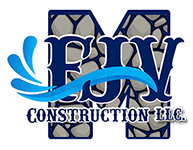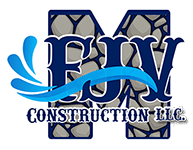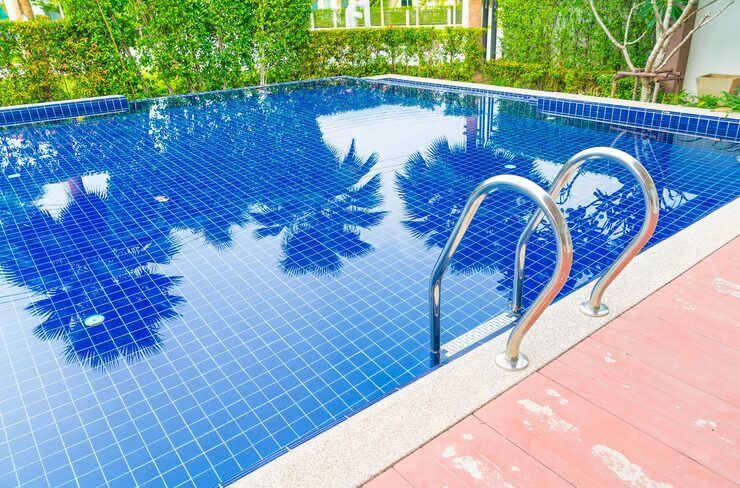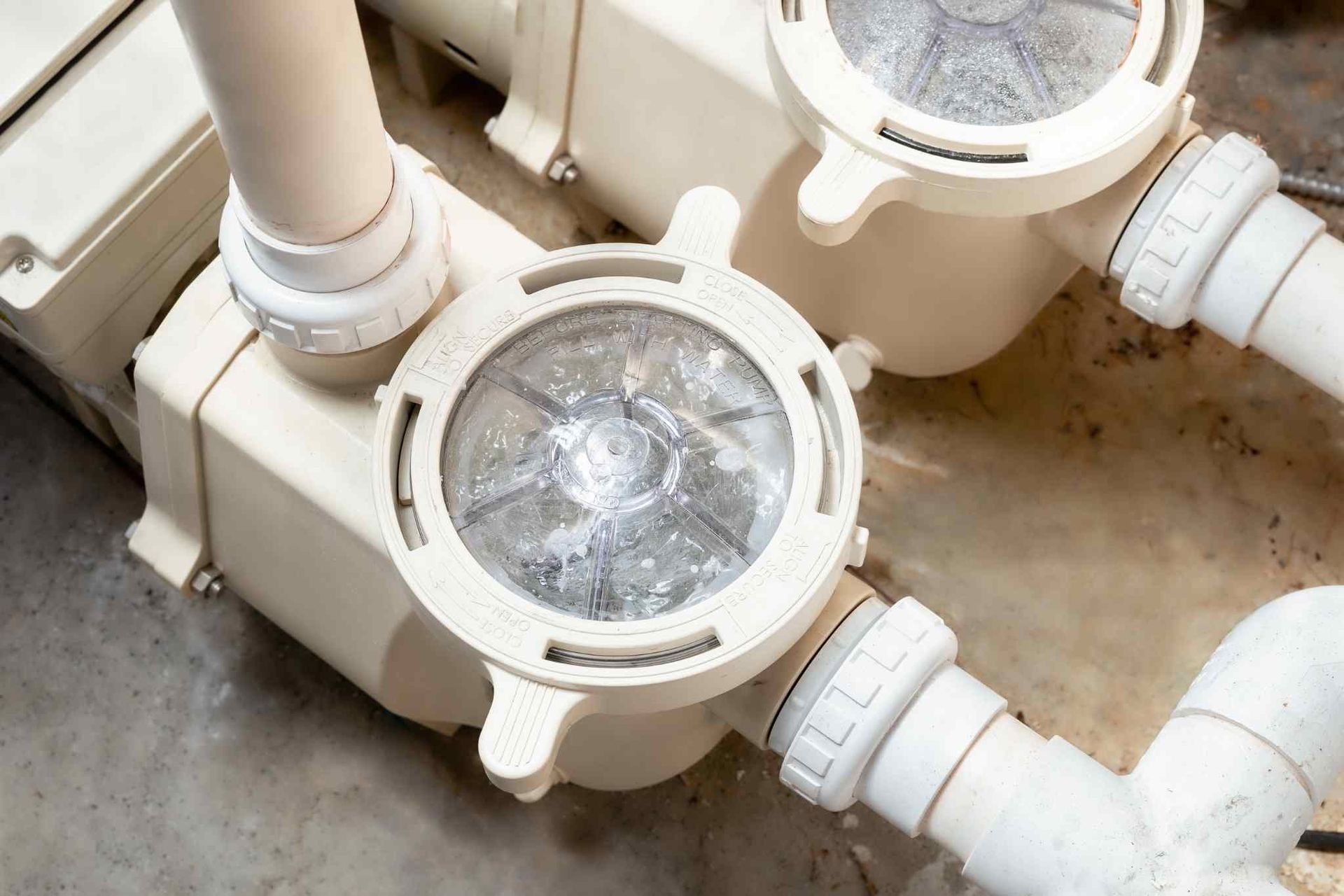What Should a Professional Swimming Pool Cleaning Service Include?
Maintaining a pristine, safe, and enjoyable swimming pool requires more than just a skimmer and chlorine tablets. Whether for residential or commercial use, professional pool cleaning services are essential for the long-term health of your pool. On average, swimming pool maintenance costs about $234 per month, covering cleaning services and utility expenses such as electricity and water.
These services offer far more than surface-level tidiness—they provide expert care through proven techniques, comprehensive maintenance routines, and commercial-grade equipment.
Here’s an outline of what a thorough swimming pool cleaning service should include, helping pool owners choose the right provider and avoid costly repairs or unsafe conditions.
Table of Contents
- Key Takeaways
- 1. Skimming and Debris Removal
- 2. Wall and Tile Brushing
- 3. Filter Cleaning and Maintenance
- 4. Water Chemistry Testing and Balancing
- 5. Equipment Inspection and Functionality Checks
- 6. Pool Circulation Evaluation
- 7. Algae and Stain Prevention
- 8. Pool Cover Cleaning and Management
- 9. Seasonal Pool Opening and Closing Services
- 10. Detailed Service Report or Checklist
- Frequently Asked Questions
- Contact FJV Construction in Danbury, CT, Today for Cleaner, Safer Pool Care!
Key Takeaways
✔ Skimming, vacuuming, and basket emptying prevent water contamination and equipment clogs.
✔ Regular scrubbing of walls, tiles, and steps stops buildup and keeps surfaces safe and clean.
✔ Cleaning and backwashing filters improve circulation, water cleanliness, and system performance.
✔ Balancing pH, chlorine, and other levels maintains safe water and prevents damage to pool materials.
✔ Routine inspection of pumps, heaters, and control systems helps avoid costly repairs and downtime.
✔ Adjusting jets and monitoring flow promotes even chemical distribution and better filtration.
✔ Preventive treatments and stain control keep the pool clean, safe, and looking its best.
✔ Regular maintenance of pool covers extends their life and prevents contamination or accidents.
✔ Professional opening and winterizing services protect the pool and plumbing year-round.
✔ Detailed checklists and digital records ensure transparent, high-quality maintenance.
1. Skimming and Debris Removal
Removing surface and sunken debris is one of the most immediate and visible tasks in professional pool cleaning services. Neglecting this can lead to water contamination, clogged systems, and uninviting aesthetics.
Skimming and vacuuming are included in most weekly and monthly pool cleaning packages as part of regular expert pool care and upkeep, ensuring no buildup compromises water quality or equipment longevity.
Key Tasks Performed by Professionals
- Surface Skimming:
Using fine-mesh skimmers or leaf nets, technicians collect leaves, bugs, pollen, and floating debris before they sink and decay.
- Pool Floor Vacuuming:
Manual or automated vacuums are used to remove sand, dirt, and organic matter that settle on the bottom and in corners of the pool.
- Steps and Ledges Cleaning:
Debris often accumulates on submerged steps, tanning ledges, and spa areas. These spots require detailed attention for complete cleanliness.
- Basket Emptying:
Skimmer and pump baskets are emptied to restore proper suction and maintain circulation. Full baskets can restrict water flow and put stress on equipment.
Why It Matters
- Prevents organic matter from decomposing and altering water chemistry
- Protects filter systems from unnecessary strain
- Reduces algae risks by removing their food source (leaves, insects)
- Maintains a clean, welcoming appearance for both private and public pools
2. Wall and Tile Brushing
Even when pool water appears clean, walls and tile surfaces can harbor microscopic buildup. This creates slippery textures, unattractive discoloration, and an ideal environment for algae growth. This aspect of swimming pool cleaning requires both the right tools and trained technique, making it a cornerstone of reliable residential and commercial pool cleaning.
Areas That Require Routine Brushing
- Pool Walls:
Especially important in concrete, plaster, or gunite pools, where surface porosity can trap fine particles and microorganisms.
- Waterline Tiles:
The area where air meets water often collects oils, sunscreen residue, and calcium deposits. Regular brushing keeps tiles glossy and clean
- Steps and Benches:
These high-traffic areas accumulate body oils and organic matter more quickly and require extra attention.
Types of Brushes Used
- Nylon Brushes
–
For delicate surfaces like vinyl or fiberglass
- Stainless Steel Brushes
–
For tougher materials like concrete or gunite
- Pumice Stones or Tile Brushes
–
To remove hard water or calcium scale from tiles
Benefits of Wall and Tile Brushing
- Prevents early staining and buildup
- Inhibits algae and mold growth on vertical surfaces
- Maintains surface texture and appearance
- Ensures swimmers’ safety by keeping surfaces non-slippery

3. Filter Cleaning and Maintenance
The filtration system acts as the pool’s kidneys, continuously removing particles and contaminants from the water. Without proper maintenance, even a chemically balanced pool can turn cloudy or unsafe. Proper filter care is a core service in weekly and monthly pool cleaning packages and is crucial for comprehensive expert pool care and upkeep.
Types of Pool Filters and Their Needs
- Cartridge Filters:
Ideal for small to medium-sized pools and require rinsing with a hose or periodic replacement. They provide efficient filtration for fine particles.
- Sand Filters:
Use silica sand to trap debris. They need backwashing to clean the filter bed. They are generally cleaned every few weeks, depending on pool use.
- Diatomaceous Earth (DE) Filters:
Offer the finest filtration available. They require backwashing and recharging with DE powder. They are often used in high-use or commercial pools.
Essential Maintenance Tasks
- Backwashing:
Reverses water flow to flush out trapped debris from sand or DE filters. Should be done when pressure rises 8–10 psi above normal.
- Cartridge Cleaning:
Cartridges are removed and cleaned with a hose or filter cleaner. Replacement is needed once worn or clogged beyond recovery.
- System Inspection:
Ensures proper pressure levels, clean filter media, and unobstructed flow paths. Prevents pump damage and circulation issues.
Why Filter Maintenance Matters
- Improves water clarity and cleanliness
- Ensures chemical treatments are more effective
- Extends the lifespan of pumps and heaters
- Reduces energy consumption by maintaining optimal flow
4. Water Chemistry Testing and Balancing
Maintaining proper water chemistry is critical for swimmer safety, water clarity, and the lifespan of pool components. Inconsistent chemical levels can cause corrosion, cloudy water, skin irritation, and algae growth. Proper chemical balance is included in all weekly and monthly pool cleaning packages, forming a foundation for reliable expert pool care and upkeep. Recommended weekly pool maintenance includes using sanitizers, oxidizers, pH balancers, and specialty chemicals designed to prevent staining and control algae growth.
Essential Water Parameters Tested
- pH Level (7.2–7.8):
Balances acidity and alkalinity. It affects chlorine efficiency and swimmer comfort.
- Chlorine or Sanitizer Level:
Eliminates bacteria, viruses, and organic contaminants. Should remain at a safe yet effective level (1–3 ppm for chlorine)
- Total Alkalinity (80–120 ppm):
Buffers pH changes to maintain water stability. It prevents pH “bounce,” which can lead to cloudy water
- Calcium Hardness (200–400 ppm):
Prevents surface erosion and etching. Too high can cause scaling on tiles and equipment
- Cyanuric Acid (CYA, 30–50 ppm for outdoor pools):
Stabilizes chlorine from UV breakdown. Overuse can inhibit chlorine effectiveness
What Makes Professional Balancing Stand Out
- Precise Dosing with Commercial-Grade Chemicals:
Avoids over- or under-treatment and supports consistent water quality without waste.
- Automated Chemical Feeders or Monitors: Used by top-tier professional pool cleaning services. Delivers real-time adjustments for large or high-use pools
5. Equipment Inspection and Functionality Checks
A swimming pool is a system of interconnected mechanical parts. Even if the water looks clean, malfunctioning equipment can quickly lead to system failure or dangerous swimming conditions. Professional technicians often use diagnostic tools to check voltage, amperage, and flow levels. As part of residential and commercial pool cleaning, these inspections are crucial to ensure uninterrupted operation throughout the season.
Key Equipment Inspected
- Pumps:
Checked for priming issues, leaks, or unusual noise. Ensures proper water flow and pressure
- Motors:
Inspected for overheating or electrical faults. Early warning signs include tripping breakers or humming sounds
- Heaters:
Tested for ignition, temperature control, and corrosion. Helps maintain consistent water temperature for comfort and efficiency
- Chlorinators (Inline or Saltwater):
Verified for scale buildup, flow blockages, and chlorine output levels
- Timers and Control Panels:
Examined for accuracy in programming. Ensures pump and light schedules operate correctly
Benefits of Routine Equipment Checks
- Prevents major breakdowns through early detection
- Extends the life of costly components
- Enhances system efficiency and reduces energy use
- Keeps pool automation systems running smoothly
6. Pool Circulation Evaluation
Effective circulation is key to consistent water quality and energy-efficient pool performance. Poor circulation allows algae and debris to settle, disrupts chemical distribution, and can strain equipment. Companies specializing in professional pool cleaning services often reconfigure jet angles or update circulation settings during routine visits. This attention to detail is a core part of expert pool care and upkeep, especially for large or complex pool systems included in weekly and monthly pool cleaning packages.
What Professionals Evaluate
- Flow Rate and Pressure:
Measured to detect clogs, leaks, or pump inefficiency. A sudden pressure drop may indicate filter or plumbing issues
- Jet Direction and Performance:
Jets are adjusted to create circular flow, reducing dead spots. Ensures better mixing of chemicals and consistent heat
- Pump Operation Cycles:
Reviewed to determine run time suitability. Timers are adjusted to align with daily use and environmental factors
Optimizing Circulation Improves
- Chemical effectiveness
- Filtration efficiency
- Prevention of algae growth
- Overall water clarity and swimmer comfort
7. Algae and Stain Prevention
Even a sparkling-clear pool can hide early signs of algae or surface staining. Without timely treatment, these issues can rapidly worsen, leading to costly restoration and health risks. Preventive measures are critical components of expert pool care and upkeep, ensuring that residential and commercial pool cleaning delivers not just clarity, but durability and health.
Algae Prevention Services Include
- Algaecide Application: Used to inhibit the growth of green, yellow (mustard), or black algae. Often applied after brushing to maximize effectiveness
- Shock Treatments (superchlorination):
Helps oxidize organic waste and eliminate chlorine-resistant pathogens. Recommended after heavy use, storms, or early signs of algae bloom
- Brushing Trouble Spots:
Corners, steps, and seams where algae tend to anchor. Loosens spores and improves chemical contact
Stain Removal and Prevention
- Metal-Based Stains:
Caused by iron, copper, or manganese in the water. Treated with stain removers or chelating agents
- Organic Stains:
Resulting from leaves, berries, or insects left in contact with surfaces. Removed through scrubbing and shock treatments
- Sequestrant Application:
Prevents metals from oxidizing and depositing on surfaces. Often included in weekly and monthly pool cleaning packages for stain prevention
Why It Matters
- Preserves pool appearance and finish
- Prevents long-term surface damage
- Reduces chemical demand caused by contamination
- Enhances safety by reducing slippery or unsanitary areas

8. Pool Cover Cleaning and Management
Pool covers serve as a protective shield, but they also require maintenance to function properly and avoid becoming a health hazard. For many clients, pool cover management is bundled into seasonal or year-round professional pool cleaning services. It’s a key part of preventive maintenance, especially in climates with heavy leaf fall or extreme weather.
Cover Maintenance Tasks Include
- Debris Removal:
Eliminates leaves, twigs, and animal droppings that collect on top. Prevents contamination when covers are removed
- Standing Water Elimination:
Uses cover pumps or siphons to remove pooled water. Prevents mosquito breeding and mold growth
- Surface Cleaning:
Scrubs away mildew, pollen, and dirt buildup. Improves cover lifespan and appearance
- Inspection for Damage:
Checks for rips, UV damage, or worn fasteners. Repairs or replacements are recommended when necessary
- Alignment and Tension Adjustment:
Ensures a tight fit to maintain insulation and barrier effectiveness. Prevents wind from lifting or shifting the cover.
Added Value for Pool Owners
- Reduces water loss through evaporation
- Keeps debris out, minimizing strain on filters
- Improves heating efficiency for heated pools
- Prevents accidental falls, especially in homes with children or pets
9. Seasonal Pool Opening and Closing Services
Transitioning between seasons requires more than just removing or applying a pool cover. It involves preparing the entire pool system for weather changes, ensuring optimal operation and longevity. Both opening and closing services are must-haves in comprehensive residential and commercial pool cleaning contracts. When included in weekly and monthly pool cleaning packages, these seasonal transitions are handled seamlessly by professionals offering reliable expert pool care and upkeep.
Spring Pool Opening Tasks
- Reinstalling Equipment:
Reconnect pumps, filters, and heaters removed for winter. Inspects for freeze damage or worn connections.
- Chemical Rebalancing:
Neutralizes any off-season imbalance or residual chemical. Prepares the pool for safe swimming from day one
- Plumbing Inspection:
Checks for cracked pipes, broken fittings, or leaks caused by freezing
- Debris Removal:
Clears settled leaves, insects, and algae from winter downtime. Deep cleans walls, floor, and steps
Fall/Winter Closing Services Include
- Lowering Water Levels:
Prevents overflow and protects skimmers during freezes
- Blowing Out Lines:
Removes water from plumbing to avoid pipe cracking in freezing temperatures. This may include adding antifreeze in colder zones
- Winter Chemical Application:
Prevents algae growth and scale formation during the off-season.
- Cover Installation and Securing:
Installs safety or winter covers tightly to keep out debris and protect children/pets
Why Seasonal Services Are Essential
- Prevents costly winter damage to plumbing and surfaces
- Ensures faster, easier reopening in spring
- Maintains chemical stability during inactivity
- Extends equipment lifespan
10. Detailed Service Report or Checklist
A thorough service report is more than a formality—it's a key component of accountability, quality assurance, and ongoing pool health. Reputable professional pool cleaning services use these reports to communicate work performed and note any issues requiring attention. When included in weekly and monthly pool cleaning packages, these reports reflect a commitment to high standards and organized expert pool care and upkeep. For both residential and commercial pool cleaning, they create a reliable feedback loop that enhances service quality and customer satisfaction.
What a Professional Report Typically Includes
- Water Chemistry Readings:
pH, chlorine, alkalinity, calcium hardness, and other relevant metrics. Indicates whether adjustments were made and why
- Completed Cleaning Tasks:
Documentation of skimming, brushing, vacuuming, and filter maintenance. Confirms consistent service delivery aligned with the client’s expectations.
- Equipment Status Summary:
Notes the condition and functionality of pumps, filters, heaters, timers, etc. Identifies wear and tear or potential points of failure.
- Visual Inspection Findings: Includes signs of algae growth, surface stains, or leaks. May contain before-and-after images if needed
- Recommendations or Alerts:
Suggest repairs, upgrades, or deep cleanings. Flags anything requiring urgent or upcoming attention
Delivery and Format Options
- Email Summaries:
Convenient digital format sent automatically after each visit. Easy to save, forward, or reference
- Client Portals or Mobile Apps:
Offer on-demand access to service history, chemical logs, and notes. Helpful for managing multiple pools or commercial accounts
- Printed Leave-Behinds:
Provided at the property for physical documentation and quick review. Ideal for properties without digital access.
Why Service Reports Are Valuable
- Establish clear communication between the technician and the pool owner
- Build trust through transparency and attention to detail
- Help track recurring issues or seasonal patterns
- Provide a professional record useful for warranty claims or insurance
Frequently Asked Questions
How often should a swimming pool be cleaned?
A swimming pool should be cleaned at least once a week to maintain water quality and clarity. Pools exposed to more debris, sunlight, or frequent use may require more frequent cleanings. Routine swimming pool cleaning helps prevent algae buildup and extends the life of pool components.
Can swimming pool cleaning help reduce chemical usage?
Yes, regular cleaning removes organic debris that can consume chlorine and other sanitizers. With proper circulation and cleanliness, chemical treatments become more effective and require smaller doses. This not only lowers costs but also creates a healthier swimming environment.
Can swimming pool cleaning be done in the rain?
Swimming pool cleaning can usually continue during light rain as long as conditions are safe. However, heavy rain may dilute chemicals and make certain tasks less effective or unsafe. Most professionals monitor the weather closely and reschedule if needed for best results.
Do I need to be home during the swimming pool cleaning?
No, most swimming pool cleaning services can be performed without the homeowner present. As long as technicians have access to the pool area, they can complete all necessary tasks. Many companies also provide digital service reports for transparency.
Is it necessary to clean a pool during winter if it’s not in use?
Yes,
winter maintenance is important to prevent damage and water imbalance. Pool covers should be checked, and occasional cleaning ensures no algae or debris buildup under the surface. Seasonal cleaning protects the pool investment even when it's not in use.
Contact FJV Construction in Danbury, CT, Today for Cleaner, Safer Pool Care!
If you're looking for reliable, expert pool care that goes beyond the basics, trust
FJV Construction—a local leader in quality craftsmanship and dependable service in Danbury, CT. With decades of experience, our team provides
professional swimming pool cleaning services along with pool installations, excavation, masonry, and other hardscape solutions tailored for both
residential and commercial properties.
From routine pool maintenance to large-scale outdoor projects, FJV Construction brings
personalized attention to every job in Danbury, CT, and surrounding areas. Whether you need weekly or monthly pool cleaning packages, a new inground pool, or stunning patio masonry, our skilled professionals deliver top-notch results you can count on.
Contact FJV Construction in Danbury, CT, today and take the first step toward a cleaner, safer, and more beautiful backyard experience!




